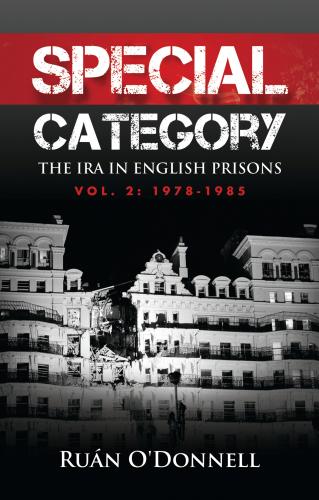107.O’Doherty, Volunteer, p. 210.
108.Derry Journal, 17 February 1978. For overview of ‘just war’ concept and theology see Charles E Rice, Divided Ireland, A cause for American concern (Notre Dame, 1985), Chapter IX.
109.O’Doherty, Volunteer, p. 211.
110.PAC News, February 1978, p. 1.
111.O’Doherty, Volunteer, p. 211.
112.Eddie O’Neill, 1 February 2008. O’Neill was held with O’Doherty in Wakefield but not close enough for the pair to converse. He gained that impression that the Derryman ‘wouldn’t talk to any of us … He wouldn’t talk to anyone’. See also Irish Post, 14 September 1985 and O’Doherty, Volunteer, p. 228.
113.Republican News, 4 February 1978. Sid ‘Seanna’ Walsh had already spent a year on the blanket in H5. Walsh spent over twenty years in prison and was selected to read the IRA’s standing down statement on 28 July 1995. Ibid. See also An Phoblacht, 1 March 1978.
114.See An Phoblacht, January 2014, p. 4 and Prison Struggle, Paper of the Relatives Action Committee, March [1980].
115.See Republican News, 11 March 1978.
116.See Jim Reilly and Jacqueline Kaye to Editor, Republican News, 18 March 1978. London Sinn Féin leader Jim Reilly addressed the Workers Revolutionary Party conference in Wembley on 26 February. Ibid., 11 March 1978. His socialist inclinations and trade union work appealed to several left wing groupings with which Sinn Féin interacted on prisoner issues. See RCG tributes in AP/RN, 4 October 1980 and FRFI, November/ December 1980, p. 16. For Livingstone and Ireland see Curtis, Ireland and the propaganda war, pp. 207–11. Kaye, an English leftist who had met Eamon Smullen on a work camp in 1960s Cuba, became drawn into prisoner support when he was jailed on arms charges in England in 1969. See Jackie Kaye, ‘What price peace?’ in FRFI, October/ November 1999, p. 6.
117.PAC Statement in PAC News, July 1977.
118.Eolas, April/ May 1977, p. 12.
119.Eolas, April/ May 1977, p.11.
120.See Des O’Hagan, Letters from Long Kesh (Dublin, 2012). O’Hagan’s twenty-two short articles were published by the Irish Times in 1972, arising from an agreement with its liberal editor Douglas Gageby. The collected edition did not appear until 2012. See Ultan Gillen, ‘Introduction’ in Ibid., pp. xi-xii. Earlier feuding between the Official IRA and the nascent INLA/ IRSP disturbed Belfast IRA men in England: ‘Is there not enough Irishmen being killed without them knocking each other off?’ Billy Armstrong to Leo Wilson, 10 March 1975, Private Collection (Wilson). Armstrong understood the tensions were caused by Official IRA inaction vis à vis ‘religious assassinations’ by British backed Loyalists. Ibid. Wilson had polled 4,000 votes in the South Antrim constituency of the October 1964 general election at which time Sinn Féin was banned in the Six Counties. Involved in the Civil Rights movement, he was a leading member with Clara Reilly and Fr. Brian Brady of the Association for Legal Justice in Belfast. See An Phoblacht, January 2014, p. 4.
121.Republican News, 3 March 1978.
122.Republican News, 3 March 1978.
123.Republican News, 22 April 1978 and IRIS, 17 February 1979. Forty-seven exclusion orders were issued between March 1978 and March 1979. HC Deb 21 March 1979 vol 964 cc1505–6. Dominic Behan, brother of Brendan and writer of ‘The Patriot Game’ rebel ballad, was among the more socially prominent people detained under the PTA in Liverpool. Irish World, 10 November 1979.
124.Republican News, 27 May 1978. Jim Reilly of the Sinn Féin Ard Comhairle represented the party in Leeds. Kaye and Alastair Logan participated in the Independent Public Enquiry into the abuse and torture of prisoners in Ireland, which convened in Dublin in May 1978. They described the workings of the PTA and the Irish prisoner experience in England. Ibid. Peoples Democracy claimed that by early 1978 Sinn Féin ‘remained ambiguous about the value of united work’ on prisoners and tended to recognize only groupings which supported the armed struggle. The RAC, closely linked to Sinn Féin, gradually excluded ultra-leftist political parities such as the Irish Workers Group which had demanded speaking rights at rallies without investing sufficient effort in the campaign. Ultimately, the PDs also ‘lost any formal position in the campaign’. See Prisoners of Partition, H-Block/ Armagh, A Peoples Democracy pamphlet, New edition, p. 12. See also IRIS, 24 March 1978.
125.See Jim Johnson, ‘Lessons of TOM’ in Hands off Ireland!, No. 1, December 1976, pp. 13–15. See also Workers Power, The British Left and the Irish War (London, 1983), p. 38. UTOM reverted to the TOM designation in 1979. Ibid.
126.Aly Renwick, 16 November 2007.
127.PAC News, June 1978. For the 1977 Marx commemoration in Highgate Cemetery see PAC News, June 1977.
128.PAC News, June 1978. Messages of support were received from Sean Mac Stiofain, Michael Mullen (General Secretary of the ITGWU), Frank McManus, Frank Maguire MP, Joan Maynard MP, Maureen Colquhoun MP, Eddie McAteer, Phil Flynn, Women and Ireland, Black Aid, UTOM, IRSP (Dublin), PROP, ICRA, RCG, IMG and Revolutionary Communist Tendency. Members of the Stagg, Gaughan, Dowd, Donnelly, McCaffrey, Fox, Nordone, Madigan, Butler, Campbell, Hackett, Mulryan, Armstrong, Kinsella, Norney, McLaughlin, Byrne, Coughlan, Gibson and Kelly families registered their approval. Republicans John Joe McGirl, Joe O’Neill (Bundoran Urban District Council), Vincent Conlon and Frank Glynn (Galway City Council) were also listed. Nancy Jenkinson, widow of Noel, and Mary Stagg, mother of Frank, joined members of Michael Gaughan’s family in expressing approval. Ibid.
129.BR Grange to DG Blunt, 21 November 1978, NAE, FCO 87/ 763.
130.‘Irish POWs Albany’ in PAC News, June 1978. Fr. Pat Fell and Hugh Callaghan remained on the wings in Albany. Ibid.
131.An Phoblacht, 22 April and 10 June 1978. See also IRIS, 31 March 1978, p. 3. Amnesty International refused to support repatriation
